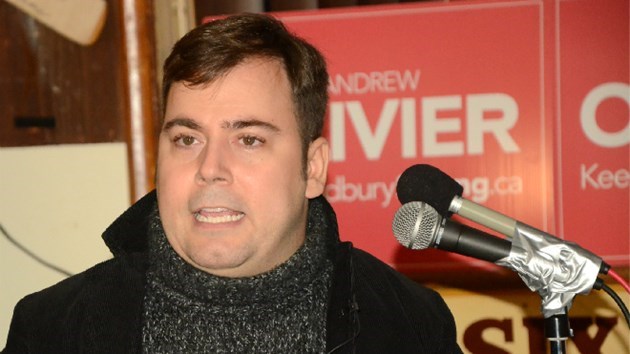Liberal Party officials testified Monday at the Sudbury bribery trial there was growing concern that Andrew Olivier wasn't getting the message he was not going to be candidate in the February 2015 byelection.
Kim Donaldson, who was the party's nominations commissioner at the time of the June 2014 general election and the 2015 byelection in Sudbury, described the process of how candidates are identified in each riding.
It was her job to ensure that a thorough candidate search was done for each riding in the general election. Under the party's constitution, she had the power to approve a nomination process for each riding.
She remembered former Mayor Marianne Matichuk's name being discussed as a possible appointed candidate for the June vote, as well as former police chief Ian Davidson.
She also remembered friction with the Sudbury riding association, which was pressing for a nomination meeting. But, Donaldson said, the candidate search wasn't yet complete.
“They didn't get it when they first wanted it,” she said. “(But) the people at the riding association don't decide the timing.”
She remembers discussions about appointing Matichuk, something strong opposed by the riding association. Describing the former mayor as “the candidate who got away,” the party eventually OK'd the nomination meeting and Olivier won.
After losing the June election in Sudbury, Donaldson said she was as surprised as anyone when Joe Cimino resigned in November, giving the Liberals another shot at the riding. When she learned in December that Glenn Thibeault was willing to switch parties and legislatures to run for them, the matter was closed as far as she was concerned.
“I understood instantly the large ramifications of this,” Donaldson said, after researching exactly who Thibeault was.
She described him as a “unicorn,” the impossible to find candidate who gave the party the best chance to win the seat. Donaldson thought he should just be appointed, but others wanted an acclimation with Olivier backing Thibeault “to keep it all in the family.”
The focus at that point was to let Olivier know what was going on, ensure he “felt respected” and knew the party wanted him to stay on side, Donaldson said.
The problem was Olivier didn't want to accept that he wasn't going to be the candidate.
“I was told bluntly that Mr. Oliver wasn't getting the hint,” Donaldson said. “He had not accepted or understood that the party was going elsewhere."
When asked why Thibeault was a better choice than Olivier, she said they had lost a Liberal “seat to the NDP” in an election where the party gained an overall majority. So they wanted the seat back and landed a local popular politician to make that possible.
Monday was Day 8 of the trial involving Pat Sorbara, Premier Kathleen Wynne's former deputy chief of staff and Liberal campaign director, and Gerry Lougheed, a local Liberal organizer. Both have pleaded not guilty at the trial in Sudbury, Ont., to offering would-be candidate Andrew Olivier a job or appointment to get him to step aside for Wynne's preferred candidate in a 2015 byelection in the city.
Lougheed defence lawyer Michael Lacy asked her whether, once the party decides to appoint a candidate, can someone else insist they're still a candidate.
"No,” she said. “It would no longer be accurate.”
Another witness, Azam Ishmael, was executive director of the OLP's caucus bureau. He said as soon as Cimino resigned, they had a decision to make in Sudbury. On the one hand, Olivier had already sold 500 memberships, so he was a shoe-in in an open nomination.
But the party wasn't as keen, since he had lost in June, and had publicly contradicted party policy on merging school boards. After Olivier had gone public in the spring election to pressure the party to have a nomination meeting, Ishmael said they were worried about more dirty laundry being aired.
“We spoke about how we need to keep everybody together,” he said, of a conference call that included him, Sorbara and Wynne on Nov. 21.
“The general direction was that we wanted to go quickly.”
“Managing the local folks” was a priority, he added.
“The goal was to find a winning candidate?” Lacy asked. “It seems obvious, but that was the goal of the Ontario Liberal Party?”
“Yes,” Ishmael replied.
He said every election – and byelection – is a balancing act between finding the best candidates for each riding, while keeping the local riding associations on board. And keeping spurned candidates happy and in the fold is also a priority.
“This is the normal part of party politics?” Lacy asked.
“Yes,” he replied.
Under questions from Sorbara lawyer Brian Greenspan, Ishmael said he overheard Wynne speaking with Olivier, trying to get him to understand that he was not going to be the candidate.
The trial resumes Tuesday morning with testimony from Thibeault, which could last until Wednesday. Then the trial will take a break until next month.
